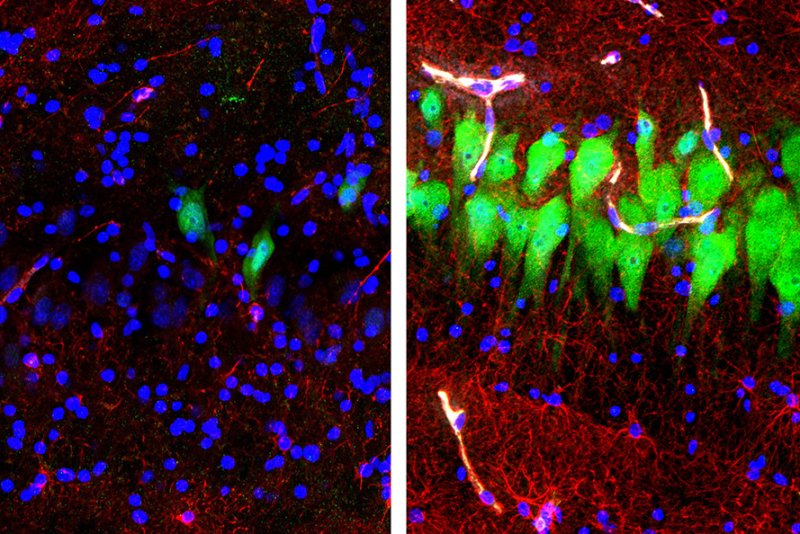When researchers connected the vasculature of a dead pig's brain to a specially designed solution, they were able to restore some cellular and neuronal functions. Photo by Stefano G. Daniele & Zvonimir Vrselja; Sestan Laboratory; Yale School of Medicine
April 17 (UPI) -- Using a solution created to preserve brain tissue and an artificial circulatory system called BrainEx, scientists at the Yale School of Medicine were able to restore some basic cellular functions inside several pigs' brains hours after death.
The breakthrough is the latest evidence of cellular resiliency in postmortem tissue. Last year, scientists observed cells continuing to express genes up to 48 hours after death.
The latest study suggests a variety of brain functions thought to end within seconds of death -- as a result of a lack of blood and oxygen -- can actually be restored hours later.
"The intact brain of a large mammal retains a previously underappreciated capacity for restoration of circulation and certain molecular and cellular activities multiple hours after circulatory arrest," Nenad Sestan, professor of neuroscience, comparative medicine, genetics and psychiatry at Yale, said in a news release.
During various lab tests, researchers regularly noticed that small brain tissues showed signs of cellular viability several hours postmortem. To find out whether this viability was widespread within a mammalian brain, scientists secured 32 pig heads from a meat-packing plant and hooked up each brain's vasculature system to their BrainEx circuitry and special solution.
In addition to preserving neural cell integrity, the solution restored some neuronal, glial and vascular cell functionality inside the pig's brain.
Researchers hope their BrainEx system -- detailed Wednesday in the journal Nature -- can help scientists study cellular functionality inside intact large mammalian brains.
"Previously, we have only been able to study cells in the large mammalian brain under static or largely two-dimensional conditions utilizing small tissue samples outside of their native environment," said Stefano G. Daniele, an M.D. and Ph.D. candidate at Yale. "For the first time, we are able to investigate the large brain in three dimensions, which increases our ability to study complex cellular interactions and connectivity."
Though some cellular and neuronal functions were restored, no electrical activity -- the kind associated with perception, awareness or consciousness -- was recorded. Scientists acknowledged that future studies involving brain restoration attempts should happen under strict ethical oversight.
"Restoration of consciousness was never a goal of this research," said Stephen Latham, director of Yale's Interdisciplinary Center for Bioethics. "The researchers were prepared to intervene with the use of anesthetics and temperature-reduction to stop organized global electrical activity if it were to emerge. Everyone agreed in advance that experiments involving revived global activity couldn't go forward without clear ethical standards and institutional oversight mechanisms."
In a commentary accompanying the paper in Nature, scientists predicted additional brain resuscitation breakthroughs would make attempts "to restore people's brains might seem increasingly reasonable."
But new opportunities to restore brain function will present new and difficult decisions for physicians, patients and patient advocates -- specifically, the decision of when to stop trying to save someone's life and start trying to save their organs for transplantation.
"The transplant community, neuroscientists, emergency medical personnel and other stakeholders must debate the issues," researchers wrote.















